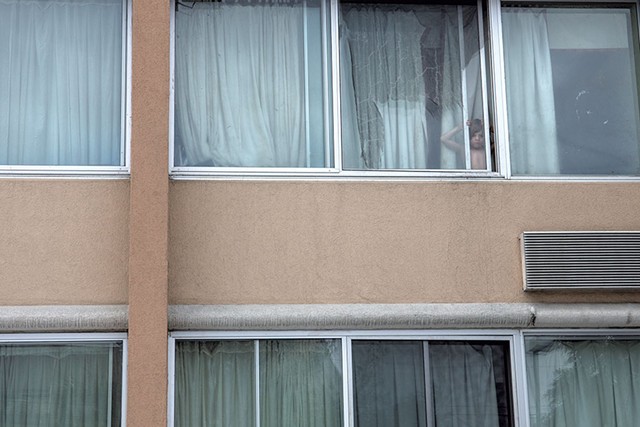
- Zachary P. Stephens
- A young child looking through the window and tattered screens at the Quality Inn in Brattleboro
Sachdev, the CEO of a company that owns seven motels in Rutland, Montpelier, Berlin, Barre and Brattleboro, received 429 security deposits of $3,300 from the Department for Children and Families when it was housing Vermonters in five of the company’s motels.
Related Motel Owners Are Withholding Security Deposits Meant to Benefit Homeless Tenants

Motel Owners Are Withholding Security Deposits Meant to Benefit Homeless Tenants
Housing Crisis
Residents who stayed four months or longer were eligible to keep the deposits when they moved out, as long as they left their room in good condition. The motel’s contract with the state stipulated that if residents left after less than four months, the motel would return to deposits to DCF — which administers the motel program — minus funds spent on repairs.
But Sachdev failed to return the money as agreed, the Attorney General’s Office said, and did not provide proof that the money had been spent on damage. In a prepared statement, the office said some motel occupants received notices saying they “may have” caused damage.
“Other former occupants had deposits withheld in full or in part based on records deemed problematic,” the statement said. “For example, records that could not expressly verify whether a particular occupant caused the alleged damages, or that were submitted without adequate supporting photographic evidence, or showed inconsistencies or appeared duplicative of other similar damages forms.”
Under the settlement, former motel residents who received inadequate information will be entitled to receive up to the full $3,300 security deposit. Others who got partial payments could get additional funds.
Related Deal Would Prevent Motel Evictions for Those Without Housing Arrangements

Deal Would Prevent Motel Evictions for Those Without Housing Arrangements
News
The enforcement action was brought through Vermont's Consumer Protection Act, a civil statute; Sachdev was not charged with any crime. From now on, motel owners and operators will be required to show the state proof that they are using security deposits for repairs and maintenance, the settlement said.
Sachdev was also ordered to pay for an administrator who will set up a website and accept claims from former occupants.
Last year, DCF reported that Sachdev’s properties had garnered close to $20 million in monthly payments from the state over roughly nine months, according to DCF data. That was roughly one-third of the department's total spending on the program, which included more than 70 lodging establishments.
The state paid Sachdev about $1.4 million in deposits, said Lauren Jandl, chief of staff at the Attorney General's Office. The state is still using his motels to house Vermonters, she said.
With a critically low supply of housing and one of the highest rates of homelessness in the country, Vermont has been using its motel program, called the Transitional Housing Program, to shelter thousands of people in the past few years. Jandl declined to say whether other consumer protection investigations related to the program are under way.
Before the pandemic, the program was used as short-term assistance for Vermonters who needed a place to stay when other options for shelter weren’t available. When COVID-19 hit, the program became an alternative to the congregate housing available in homeless shelters.
Before 2020, about 250 households a year participated in the program. In 2022, more than 1,800 households were served, according to a DCF report to the legislature.
Vermont continues to shelter people who are experiencing homelessness in motels.







Comments
Comments are closed.
From 2014-2020, Seven Days allowed readers to comment on all stories posted on our website. While we've appreciated the suggestions and insights, right now Seven Days is prioritizing our core mission — producing high-quality, responsible local journalism — over moderating online debates between readers.
To criticize, correct or praise our reporting, please send us a letter to the editor or send us a tip. We’ll check it out and report the results.
Online comments may return when we have better tech tools for managing them. Thanks for reading.